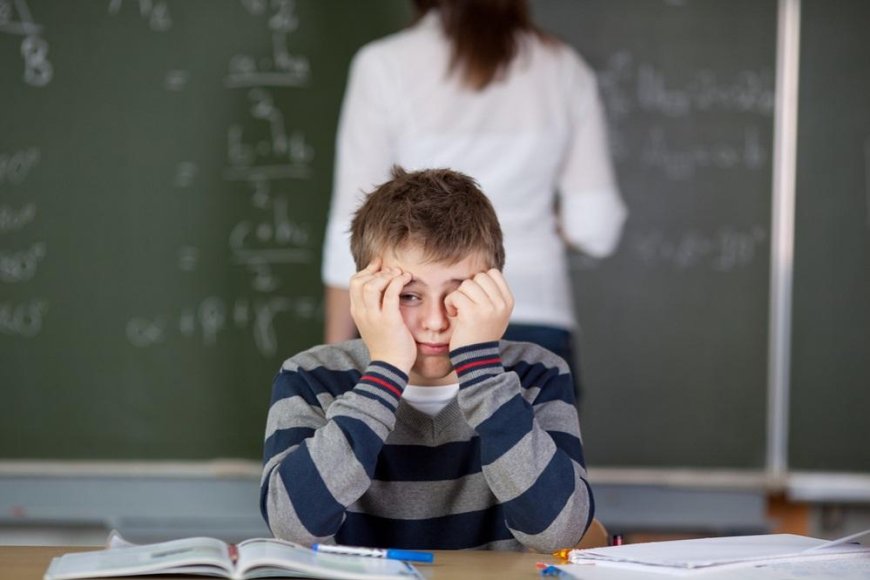A weak teacher - do you know what his characteristics are?
negative behaviors in your child's school that may be adversely affecting his or her education. A weak teacher - do you know what

Find out the general characteristics of a poor teacher. Then try to identify some common negative behaviors in your child's school that may be adversely affecting his or her education. A weak teacher - do you know what his characteristics are.
In our today's article, we are going to present you the most typical traits that usually allow you to judge whether you are faced with a weak teacher, or whether you are dealing with an excellent professional and a person who is truly dedicated to his role.
A popular belief among many in the education system is the completely false belief that being strict with your students is the right way to make them learn better.
It often happens that a poor teacher tries to be as strict as possible. But the truth is that the "worse" a teacher is, the less students pay attention to both him and the subject he is teaching. In fact, students are even afraid, sometimes creating a conflict that can negatively affect their future.
Unfortunately, this almost military teaching drill is still extremely popular with many teachers. And most of them do nothing to create any positive learning experiences for their students.
A weak teacher always does the same¦ or how?
Find out the general characteristics of a poor teacher. Then try to identify some common negative behaviors in your child's school that may be adversely affecting his or her education. Here are some basic points to pay special attention to:
A poor teacher tries to put the blame for poor grades on others and arouse fear among students
This type of teacher likes to highlight student failures in public and even make fun of them in front of the class. He also has a tendency to inadvertently cause his students to misbehave, which limits their ability to learn. And, of course, it translates into poor grades and academic results.
Students' fear grows even more when questioning. This is especially true when the student is paralyzed even knowing that he may make a mistake answering a question asked by the teacher in front of the class.
As a result, children develop a certain level of distrust towards the teacher, and therefore they are reluctant to participate in classes with such a person, precisely for fear of making a mistake.
A poor teacher discourages class attendance and do not assess your learning progress on an ongoing basis
A poor teacher never takes into account the level of commitment of his students. He always wants to have full and absolute control over his class, refusing to provide additional explanations when a student wants to become deeply interested in a specific topic. According to representatives of this group of educators, doing so would only cause unnecessary delays in the program implementation process.
Teachers often overlook efforts and attitudes adopted by students to improve their academic performance. Rather, they base their grades only on the results of written tests and oral answers.
Must Read: Don™t waste your time “ learn effectively
Blaming students for the overall poor academic performance of the class as a whole
A poor teacher never even tries to think about why most of his students get poor grades. Instead, he assumes that poor academic performance is the result of students' disinterest in the topics he is teaching. Such educators never ask themselves what their role may be in this particular situation.
Ignoring the need to modernize teaching methods or adapt them to the current situation
A poor teacher never updates his teaching techniques or teaching materials. It also does not care to keep abreast of new technologies or pedagogical trends. Moreover, many of these educators do not allow their students to use the same modern and advanced resources, neither in class nor at home.
A weak teacher always wants to have full authority over the class
Some teachers find that keeping a certain distance from their students gives them an alleged advantage. That's because they think the whole class will then see them as some kind of authority.
However, experts say teachers who develop closer relationships with their students gain more respect and admiration in return. In addition, they provide their students with a higher level of trust and security. This attitude persists in them for the rest of their lives, that is, into adulthood.
Avoiding delving into specific issues
Poor teachers only care about teaching their students the absolute basics. This means that they merely touch the surface of the entire issue, or even the entire subject. In turn, because of the fear of such teachers, their students do not dare to ask for more detailed explanations.
A poor teacher just doesn't like children
A good teacher must show some degree of empathy towards each of his students. And, as a rule, she tries to make the class feel comfortable and want to learn. But why don't some teachers even like children?
In primary school, some educators cannot tolerate the screaming, confusion and general noise typical of children of this age group.
Conversely, in high school, teachers may become more frustrated with students who are unable (or unwilling to) pay attention to the subject they teach. Or they are just more interested in other things.
In addition, many teachers simply lose their motivation to work due to low salaries. This means that even if they put in more time and effort, they are not getting a fair payment for their work. So if there is no motivation, the consequences are quite clear.
Summarizing our article today, we would like to state that a poor teacher is simply characterized by a general lack of commitment towards his students. As well as numerous gaps in their knowledge.
